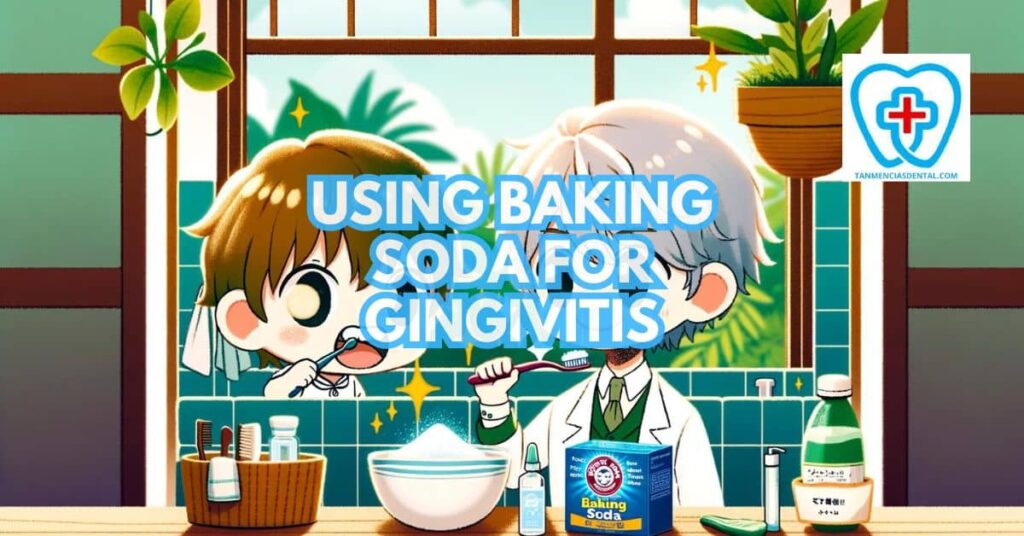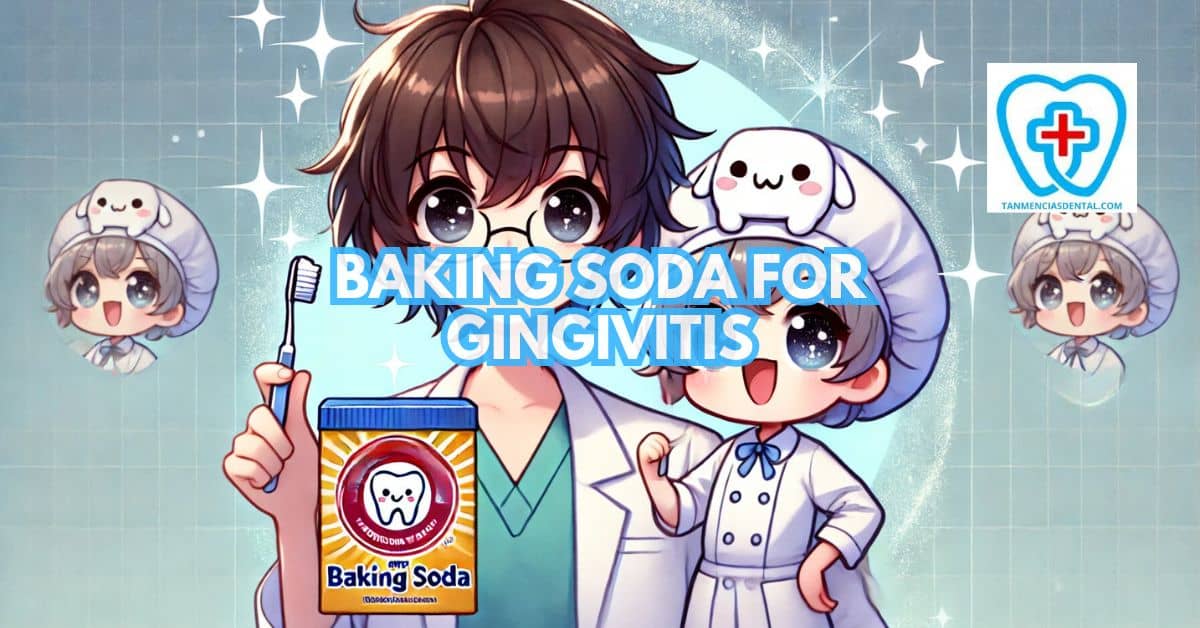Using baking soda for gingivitis has gained popularity as a natural, effective way to support oral health.
Unlike many commercial oral hygiene products, baking soda is free from synthetic chemicals and preservatives, making it a healthier option for those with sensitive gums.
Its affordability and accessibility make it easy for people to incorporate into their daily routines.
Baking soda’s gentle abrasiveness helps remove plaque and bacteria, which can contribute to gingivitis.
For those seeking natural remedies, baking soda offers a simple, eco-friendly solution to help maintain gum health.
1. Understanding Gingivitis: Signs and Importance of Treatment
Gingivitis is the initial stage of gum disease, characterized by inflammation, redness, and swelling of the gums.
It often results from poor oral hygiene, which allows plaque—a film of bacteria—to accumulate and irritate the gum line.
Common signs include gums that bleed easily when brushing or flossing.
Ignoring these symptoms can lead to periodontitis, a more severe form of gum disease that can cause tooth loss and other health complications.
Timely treatment of gingivitis not only prevents progression but also reverses gum damage, restoring oral health.
🦷 Hydrate for a Healthier Smile: Transform Your Dental Routine by Drinking Water Before Brushing
2. Can Baking Soda Help with Gingivitis? Exploring the Potential Benefits
Baking soda, also known as sodium bicarbonate, has gained attention in dentistry for its natural approach to managing gum health.
Its mild abrasive quality allows it to effectively remove plaque, which is a major factor in gum disease, without damaging the delicate gum tissue.
Baking soda also neutralizes the acids that harmful bacteria produce, reducing the risk of gum disease and cavities by creating a healthier environment in the mouth.
Its antibacterial properties target the bacteria that can lead to gingivitis, making it an effective aid in daily oral hygiene.
When mixed with water as a mouthwash, baking soda can help soothe irritated gums, offering relief from common symptoms of gingivitis like redness and swelling.
Furthermore, baking soda’s low cost and wide availability make it a convenient choice for many people looking for natural alternatives to conventional oral care products.
By incorporating sodium bicarbonate into a daily routine, individuals can support their gum health and help prevent further dental issues.
🦷 Revitalize Your Smile: How a Root Canal in Marikina Can Save Your Teeth
3. Scientific Evidence Supporting Baking Soda for Gingivitis
Research shows that baking soda plays a key role in reducing plaque buildup, which is one of the main causes of gum disease.
Its effectiveness lies in its ability to neutralize harmful acids produced by bacteria in your mouth, which can otherwise lead to gum irritation and inflammation.
Regular use of a baking soda toothpaste has been shown to significantly lower the risk of developing gingivitis by keeping plaque levels under control.
Baking soda’s antibacterial properties further help by decreasing the amount of harmful bacteria in your mouth, which is crucial for preventing gum disease.
Some studies suggest that combining baking soda with a small amount of hydrogen peroxide can enhance its bacteria-fighting effects, as hydrogen peroxide acts as a mild antiseptic that kills additional bacteria.
This combination may help prevent the growth of plaque-causing bacteria while also soothing inflamed gums.
Overall, these scientific findings support baking soda and gum disease prevention as an effective, natural approach to maintaining gum health.
🦷 The Truth About Teeth Whitening Strips: Are They Friend or Foe for Your Dental Health?
4. Important Considerations: Limitations of Baking Soda for Gum Disease
While baking soda can help reduce dental plaque and ease gingivitis symptoms, it is not a complete solution for more serious gum conditions, such as periodontitis.
Its mild abrasiveness can effectively remove surface stains and some plaque, but if used too often or with too much pressure, it can wear down the enamel, leading to tooth sensitivity.
Using about a teaspoon of baking soda mixed with water for a gentle swish can minimize abrasion and still provide some benefits, though it should not be relied upon as a sole cleaning method.
Additionally, baking soda lacks fluoride, a mineral that strengthens tooth enamel and helps protect against cavities.
Therefore, it is best to use baking soda alongside fluoride toothpaste rather than as a replacement.
People should also remember that baking soda cannot treat infections or more advanced gum disease stages, which require professional dental care.
Regular dental visits are essential to address underlying issues that home remedies cannot cure.
🦷 Behind the Mask: How Dentists Tackle Teeth Cleaning for Braces—A Sneak Peek into Dental Care!

5. Using Baking Soda Safely: A Guide for Gentle Application
To use baking soda safely for gingivitis, it is important to mix it with water to form a paste that is not too abrasive.
Apply this paste with a soft-bristled toothbrush to minimize damage to the gums and enamel.
It is recommended to use baking soda just a few times a week as part of a comprehensive oral hygiene routine.
After brushing with baking soda, rinse your mouth thoroughly with water to remove any remaining particles that could cause irritation.
By following these steps, baking soda can be a safe and effective supplement to your oral care regimen.
🦷 Sip Smart: Discover the Best Drinks That Nourish Your Teeth While Quenching Your Thirst
6. Not for Everyone: Who Should Avoid Baking Soda for Gingivitis?
Individuals with sensitive teeth or existing enamel erosion should avoid using baking soda, as it can exacerbate these conditions.
It is also not suitable for children under six, as their developing enamel might be too delicate for even mild abrasives.
People undergoing orthodontic treatments like braces may find that baking soda irritates their oral tissues.
Those with severe gum disease should consult their dentist for specialized treatments rather than relying on home remedies.
Anyone with allergies to baking soda should refrain from using it in their oral care routine.
🦷 Defeating Dry Mouth and Gingivitis: Strategies for a Healthier Mouth and a Brighter Smile
7. The Mainstays of Oral Hygiene: Brushing and Flossing Remain Crucial
No matter what additional tools or remedies are used, brushing twice a day with fluoride toothpaste and flossing daily are the most effective ways to maintain oral health.
These practices remove plaque effectively, reducing the risk of gingivitis and periodontal disease.
Flossing, in particular, reaches areas between the teeth and below the gumline where baking soda and toothbrushes cannot reach.
Regular tooth brushing and flossing also help prevent the need for more drastic measures by maintaining healthy gums and teeth.
Neglecting these basic steps can undermine any benefits gained from using natural remedies like baking soda.
🦷 Need Dental Care on a Holiday? What You Should Know About Dentist Availability on Bank Holidays
8. Diet and Your Gums: The Importance of a Healthy Diet
A balanced diet rich in vitamins and minerals supports overall health, including gum health.
Foods high in vitamin C and calcium can strengthen the gums and the enamel of your teeth, helping to prevent gum disease.
Omega-3 fatty acids, found in fish and flaxseeds, have been shown to reduce inflammation, which may benefit those with gingivitis.
Avoiding sugary snacks and drinks helps prevent the growth of bacteria that cause plaque and tartar buildup.
Thus, maintaining a healthy diet is a crucial component of preventing and managing gingivitis effectively.
🦷 Green Tea and Oral Health: Is It Safe to Sip After Brushing Your Teeth?
9. Regular Dental Checkups: Why They Are Essential for Gum Health
Regular dental checkups are indispensable for maintaining gum health, as they allow professionals to identify and treat problems before they escalate.
Dentists can perform a thorough cleaning to remove tartar, a hardened form of plaque that cannot be eliminated by brushing and flossing alone.
These visits also provide an opportunity for dentists to assess the effectiveness of your current oral hygiene practices.
Early detection of gum disease at these checkups can lead to simpler and more effective treatments.
Generally, visiting a dentist every six months is advised, although some individuals might need more frequent visits based on their dental health status.
🦷 Feed Your Smile: The Top Foods for Strong Gums and Healthy Teeth
10. When to See a Dentist: Signs That Professional Care is Needed
If you experience persistent bad breath, gum recession, or discomfort when chewing, these may be signs that professional dental care is necessary.
Bleeding gums during brushing or flossing, despite good oral hygiene habits, indicate the need for a dental evaluation.
Swelling or redness that does not resolve with home care is another reason to consult a dentist.
Sensitivity to hot or cold foods and drinks can also signify gum disease or enamel wear.
Prompt dental visits when these symptoms appear can prevent the progression of gum disease and mitigate its effects.
🦷 Overcoming Your Fear of Brushing: Tips to Conquer Anxiety and Embrace a Healthier Smile
11. Beyond Baking Soda: Additional Tips for Healthy Gums
In addition to using baking soda, incorporating an antiseptic mouthwash into your daily routine can help control plaque and bacteria.
Quitting smoking is another critical step, as smoking significantly increases the risk of gum disease.
Managing stress effectively can also reduce the likelihood of inflammation, which exacerbates gum problems.
Regular exercise and adequate hydration contribute to overall health, which is reflected in gum conditions.
These holistic approaches complement traditional oral care and can enhance the effectiveness of natural remedies like baking soda.
👨⚕️ Conclusion
While natural remedies like baking soda can play a beneficial role in gum health, they should not replace fundamental oral hygiene practices or professional dental care.
Integrating baking soda into a well-rounded oral hygiene routine that includes regular brushing, flossing, and dental checkups can provide the best defense against gingivitis.
Always discuss any new treatment with your dentist to ensure it complements your specific health needs.
By wisely combining traditional and natural approaches, you can maintain optimal oral health and prevent the progression of gum diseases.
😊 Self-Promotion
Visit us at Tan-Mencias Dental Clinic in Parang, Marikina City, where your smile and oral health are our top priorities.
Our friendly team is dedicated to providing you with the best dental care in a comfortable and welcoming environment.
For any questions or to schedule an appointment, feel free to call us at 9171451074, send us a message through our Facebook page, or use the contact form on our website.
We’re here to assist you with all your dental needs and ensure you leave our clinic with a healthier, brighter smile.
Choose Tan-Mencias Dental Clinic for a caring and professional dental experience!

